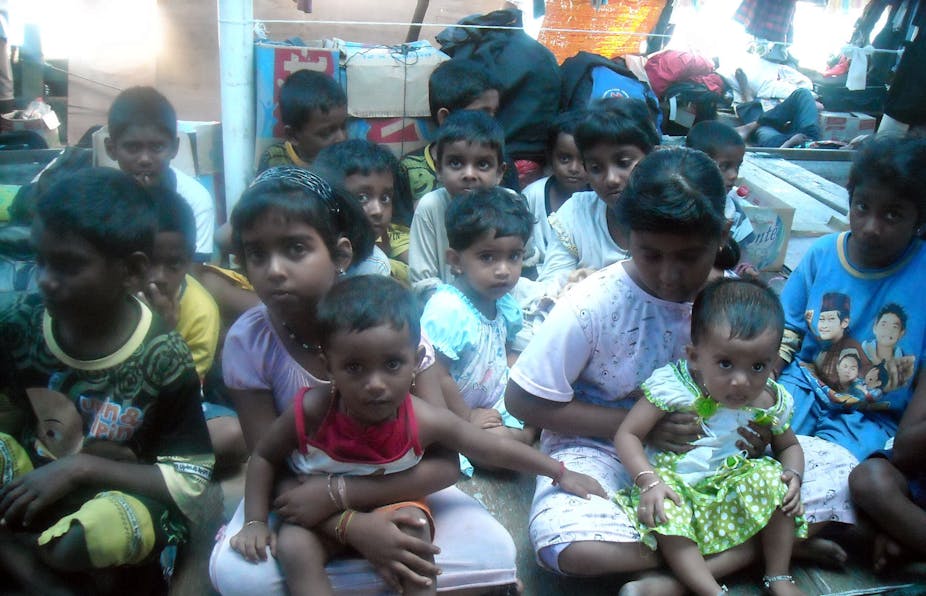I was recently invited to give a talk at a private club in a Melbourne suburb. A colleague has been a member for some years and arranged an invitation for me to speak at one of its regular dinners. Asked for a title for my speech, I suggested “Is this really what we are?”
I was surprised to receive another email from my colleague which read, in part:
Completely out of the blue last week the club committee received a petition from a small number of members stating that the club has a history of not asking guest speakers who might address political or religious topics. Enough of the committee met and after a brief discussion voted to uphold this tradition … at this stage under direction from the committee I have to inform you that my invitation to you to address the club has been withdrawn!
The petitioners were right in assuming that I had planned to speak about Australia’s response to boat people. But it is sadly blinkered to think of this as a “political or religious topic” and all the more foolish if they imagined that my view is a party-political one.
For years I have argued that the treatment of asylum seekers is a moral issue, not a political one. It is ultimately a test of the moral character of the nation, one that should concern all Australians. Sadly for us, and tragically for refugees, the issue has been caught up in politics.
Politics blinds us to the core issue
Everyone knows that refugees exist. From the beginning of time, people have been forced to flee for safety. Everyone knows that seeking asylum is a dangerous enterprise, a lottery in which only a lucky few survive.
Australia’s response to refugees is oddly mixed. We have an offshore resettlement program, which brings in 13,750 people a year from refugee camps overseas. While the number is small, the voluntary resettlement program is something to be proud of. Not all countries have equivalent programs.
Then we have people who are admitted to Australia on short-term visas and then seek asylum. Most of them are ultimately assessed as not being refugees, but in the meantime they are allowed to live in the community and cause no discernible problem.
Then there are boat people. Typically they arrive in small numbers, compared to the other two streams. They commit no offence by coming here the way they do, but it has become standard to call them “illegals”: a tag that apparently makes it more comfortable to mistreat them.
More than 90% of them are ultimately assessed as refugees, legally entitled to our protection. Despite that fact, they are the focus of intense hostility. This is largely because they have been demonised and (quite falsely) characterised as criminals from whom we need to be protected.
The truth is that almost all of them are escaping fears we can scarcely imagine. Their genuine desperation explains why they are willing to risk their lives at sea.
It is these people who are locked up in detention centres here and in Nauru and Manus Island in Papua New Guinea. The detainees are held indefinitely; no-one can tell them for how long. Psychiatrists are unequivocal about the toxic effects of the uncertainty of this detention: it drives people to hopelessness and despair.
Between 2001 and 2006, people commonly started self-harming after about 18 months: when you are powerless and have lost all hope, self-harm is simply a cry for help.
Since the revival of the Pacific Solution, coupled with its so-called “no advantage principle”, boat people are told informally that they will likely be stuck in limbo for five years. It now takes just nine months for people to resort to self-harm. That is a grim kind of achievement, not one to be proud of.
The Pacific Solution has been explicitly promoted as a policy of deterrence. If the risk of dying at sea is not a deterrent, detention has to be pretty awful to be an effective deterrent.
In denial about a moral duty
The great question that underlies Australia’s treatment of asylum seekers is this: if a person arrives here, uninvited, asking us to protect them from persecution, how should we treat them? These people have committed no offence; nearly all of them are genuinely fleeing persecution.
What is a decent human response to someone in those circumstances? Our answer to that question defines us.

A person’s character is measured by their conduct; a country’s character likewise. At present, Australia is seen as a country that is wilfully cruel to people who are frightened enough and courageous enough to risk their lives at sea to seek safety here. We deliberately mistreat innocent people to ensure that others will not come asking us for protection.
How you treat a defenceless person is, first and last, a moral question. The fact that the question becomes a political plaything does not convert it from a moral question to a political one. The moral question remains, even if the answer is contaminated by politics.
It is a reasonable thing for a club to place a ban on the discussion of political or religious topics. But it is another thing to prevent a discussion that goes to the heart of the nation’s character.
Hiding behind a rule that forbids discussion of politics may ease the conscience of some club members, but it betrays either a profound ignorance of the real question or, worse, unwillingness to face uncomfortable moral facts.
Many clubs gain their cachet by excluding people and Australia, by its conduct, imitates that behaviour: a lot of Australians say that the refugee question was “answered at the last election”. In truth, the real question was never even addressed.
And one suburban club, just like Club Australia, would prefer to turn its back on the real issue by pretending it is just politics.

